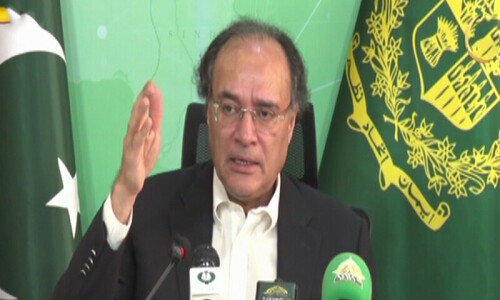WAD MADANI: In a war-devastated district of Sudan’s capital, Abbas Mohammed Babiker says he and his family have only been able to eat once a day. Now even that is in doubt, but on Sunday a citizens’ support group issued an urgent appeal for donations to help people like him.
“We only have enough for two more days,” Babiker said from Khartoum North, where residents said at least one person, a local musician, has already died from hunger.
Since April 15, battles between Sudan’s army led by Abdel Fattah al-Burhan and the paramilitary Rapid Support Forces (RSF), headed by Mohamed Hamdan Daglo, have killed more than 3,900 people, according to the latest toll from the Armed Conflict Location & Event Data Project (ACLED).
More than 2.6 million people have been internally displaced, mostly from Khartoum, the International Organisation for Migration said.
Sudan war enters 100th day as mediation attempts fail
Thousands who remain in the capital, particularly in Khartoum North, are trapped at home without water since the local water station was damaged at the start of the war.
Residents say there is only intermittent electricity and food has nearly run out.
Across the country, about one-third of the population already faced hunger even before the war began, said the UN’s World Food Programme. Despite the security challenges, the agency says it has reached more than 1.4 million people with emergency food aid as needs intensify.
“With the fighting, there is no market anymore and anyway we have no money,” said another resident of Khartoum North, Essam Abbas.
To help them, the local “resistance committee”, a pro-democracy neighbourhood group, issued its emergency appeal.
“We have to support each other, give food and money and distribute to those around us,” the committee wrote on Facebook.
In adjacent Omdurman, Khartoum’s other battle-scarred sister city, locally known violinist Khaled Senhouri “died from hunger” last week, his friends wrote on Facebook.
In his own online posts, Senhouri had said he was unable to leave home because of the fighting and had tried to hang on with the supplies that he had. It wasn’t enough.
Mediation attempts fail
Clashes flared in parts of Sudan on the 100th day of the war on Sunday as mediation attempts by regional and international powers fail to find a path out of an increasingly intractable conflict.
Infrastructure and government in the capital have fallen apart while fighting has spread westwards, particularly to the fragile Darfur region, as well as to the south, where the rebel SPLM-N group has tried to gain territory.
Over the weekend, the RSF moved into villages in Gezira State directly south of Khartoum, where the army conducted air strikes against them, according to witnesses.
In Nyala, one of the country’s largest cities and capital of South Darfur, clashes have continued since Thursday in residential areas, according to witnesses. At least 20 people have been killed, medical sources say. The United Nations says 5,000 families have been displaced. Key facilities have been looted, residents say.
“Bullets are flying into homes. We are terrified and no one is protecting us,” said 35-year-old Salah Abdallah.
The fighting gave way to ethnically targeted attacks by Arab militias and the RSF in West Darfur, from which hundreds of thousands of people have fled to Chad.
While the two sides have shown openness towards mediation efforts led by regional and international actors, none has resulted in a sustained ceasefire.
Both sides have sent delegations to attempt to re-start talks in Jeddah that have yielded often-violated ceasefires.
But the Sudanese foreign minister said on Friday that indirect talks had not begun seriously.
The leaders of the army and RSF headed a joint council since the ouster of Omar al-Bashir in 2019, and diverged over plans for a transition to democracy.
Civilian political groups as well as the RSF have accused the army of turning a blind eye to appearances by wanted Bashir loyalists in recent days.
The Forces of Freedom and Change, the main civilian coalition, said on Sunday it was holding meeting in Egypt, which has offered itself as a mediator in the conflict.
Published in Dawn, July 24th, 2023













































Dear visitor, the comments section is undergoing an overhaul and will return soon.